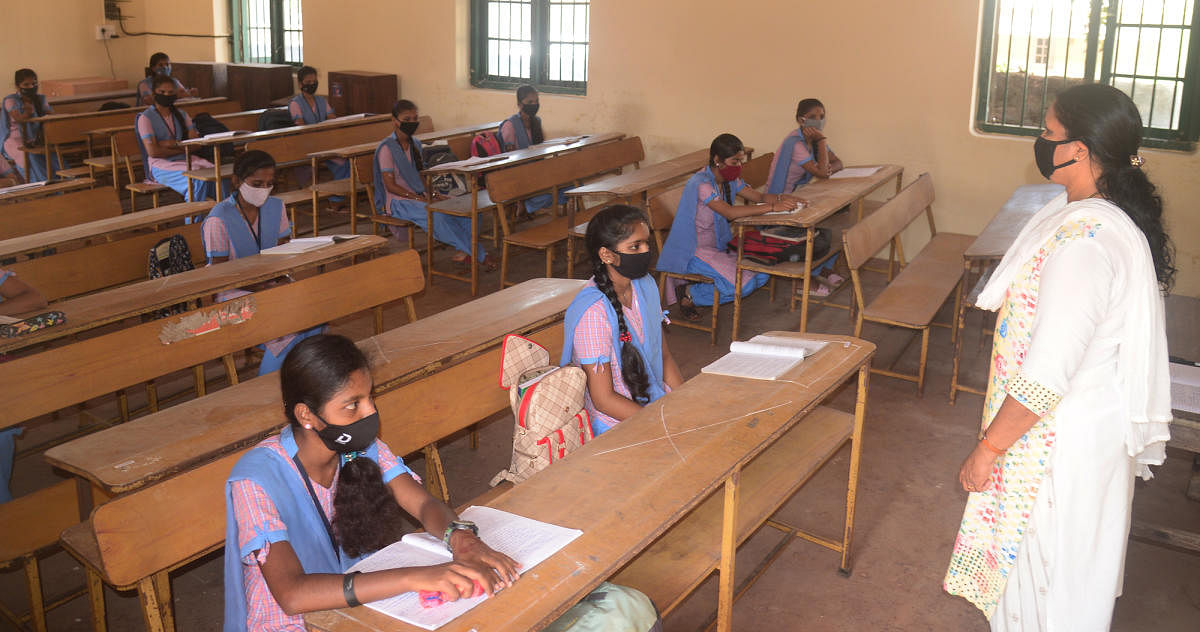
The government-appointed technical advisory committee (TAC), submitted an interim report to the Karnataka government in which it recommended the reopening of educational institutions.
The committee argued that education is the fundamental right of a child and stated that reopening physical schools would optimise learning, ensure physical and mental health well-being and fulfill the nutritional needs of children.
“We are not asking for schools to be reopened right this moment. The recommendation is to reopen schools in a staggered manner, as cases are significantly reducing in the city. We do not know how much longer this pandemic will go on, but we cannot keep waiting forever because this is will greatly impact the children’s future,” says Dr Jagadish Chinnappa, pediatrician and one of the 16 members of the TAC.
He recommends schools in the rural areas and Bengaluru outskirts to reopen under a decentralised system, keeping in mind the huge part schools play in the daily lives of kids. “In many localities children often depend on the meals provided at school. With schools shut, they are being forced to fend for themselves,” he adds.
Dr Vishal Rao, dean of academic research at a cancer centre and member of the government’s Covid task force, is in agreement. “Rural students will suffer if classes are not resumed. We have been witnessing a sporadic increase in child marriage and child labour in rural areas during the lockdown,” he says.
He added that the committee has given suggestions to balance both urban and rural students’ needs.
Shamantha K, counselling psychologist, believes this recommendation comes with a long list of pros and cons, which need to be taken into consideration before a decision is made.
“Schools physically reopening might do wonders for children, especially the younger generation who spent the last year or so in isolation. The pandemic and its effects on kid’s lives has led to an increase in depression and anxiety disorders among children. Schools reopening might bring back a sense of normalcy into their lives,” she says.
However, she believes offline classes should only commence if students’ safety is guaranteed. “It is believed that the possible third wave can impact the kids in a large way, so in the wake of that it might not be the best decision for kids to resume offline classes,” she adds.
When schools do end up reopening in the city, she recommends a staggered process to avoid a sudden shift in children’s lifestyle.
“Instead of shutting down online classes completely and getting back to offline classes, a mixture of both must be used to ease kids into the new new lifestyle. A sudden change can lead to many problems among children,” she advises.
Dr Vishal, says, “Wearing masks, studying in well-ventilated classrooms, and sanitisation are the three pillars for schools to keep in mind.” He recommends every school hire paediatricians to monitor children’s health every seven days and ensure that students always remain in the school bio
bubble.
Ready to open schools?
Suseela Santhosh, director, Vishwa Vidyapeeth, says, “Children should come out of their cocoons and face the real world.” She suggested that even batch-wise reopening of classes weekly once or twice would benefit students’ psychological well-being.
“Children are going to shopping malls and restaurants. Why can’t they attend school?”, she said, questioning the delay in reopening of schools.
However, not all schools are eager to restart offline classes in full swing.
Another educationist, says, “We should first think about opening school in a staggered manner following all precautions rather than debating whether to open schools or not. We will take all stakeholders into consideration, including parents before resuming classes.”
She also raised concerns that in the last year, children didn’t gain social skills and missed live interaction with their peers because of the online mode of learning.
“Teachers can train children better in offline classes. Online teaching is never a substitute for in-class teaching. There will be one-to-one interaction, better student responses, and we can gauge the understanding levels of each child in the classroom,” says Sr Lakanita, Principal of Nirmala Rani High School.
Preparations to resume offline classes
Principal of a prominent school in the city said that her school will abide by all the protocols set by the government before reopening the school. “We will comply, be it social distancing, sanitization, or cap only 50 per cent class strength.”
However, she pointed out that it would be an extra burden for teachers to keep taking classes with a 50 per cent allowance on a rotational basis.
“We also have a team of councillors and nurses to take care of our children when they suffer from any illness,” she added.
Vishwa Vidyapeeth has installed organic disinfection tunnels through which students and staff should enter the school, and has ensured that it’s staff have at least got the first dose of vaccine.
“Asking primary class students to follow Covid-appropriate behaviour in school will be an arduous for teachers. It is not at an easy task, it will call for some training”, says Sr Lakanita.